This post also appears on our IMHK Substack.
Below, “How to Save U.S. Democracy” — presented as concluding remarks to our IMHK Town Hall. But first, a few words on…
IMHK’s Town Hall
Yesterday, Indivisible of Manhattan Kansas (IMHK) held a town hall at our public library. Over 200 people came. 40 watched from an overflow room, and more joined us on-line. Our federal representatives — Senator Moran, Marshall, and Congressman Mann — chose not to attend.
So, we addressed our remarks to the three empty chairs representing the representatives who are supposed to represent us.

We were veterans, educators, healthcare workers, at least one farmer, a high school sophomore, parents, grandparents, members of our LGBTQIA community, people who just moved to Kansas, people with family in Kansas going back generations, people of many walks of life, different faiths, different races, ethnicities, sexualities, and histories. We were and are all concerned about the state of our democracy.
We had many questions:
- How can you support a president who acts unconstitutionally?
- How do you justify watching people suffer and be hurt?
- Why didn’t you attend? Was it fear of retribution from the Trump-Musk presidency?
Watch the video for a full account.
At the end, we offered a 4-point plan for saving our democracy. We’re now reproducing that here with a 5th point.
How to Save U.S. Democracy: A 5-Point Plan
1: First, remember this. We outnumber the autocrats. The dismantling of our federal government, from the National Parks to the USDA to the Dept. of Education, to firing air traffic controllers, all of this — it’s not popular. These are not popular plans.
That’s why they’re disregarding the Constitution. Autocrats use autocracy to impose their plans because their plans are unpopular. They could not achieve this degree of destruction via democratic means.
Fortunately, people opposed to these plans far outnumber the people implementing these plans. Remember that: We outnumber the autocrats.
To that, you may say: OK, we may have the numbers, but they have the power. That’s a fair point.
2: So, the second thing to keep in mind is 3.5%. When 3.5% of a population actively engages in sustained non-violent opposition to a political regime, that 3.5% can topple the regime. This happened in 1986, when millions of Filipinos peacefully protested via the People Power movement. The Marcos regime fell on the fourth day of the mass protest.
There are many other examples. Erica Chenoweth of Harvard University’s John F. Kennedy School of Government and Maria Stephan of the U.S. Institute of Peace looked at 323 mass movements that challenged repressive regimes, covering the years 1900 to 2006. And they wrote a book: Why Civil Resistance Works: The Strategic Logic of Nonviolent Conflict.
They find that mass demonstrations of 3.5% of the population (and up) are so large that they cannot be ignored. They find that diversity is the strength of these movements. When you reach 3.5 percent, you’re cutting across a broad swath of the population — members of churches, schools, the media, sports teams, businesses, the military, and so on. The sheer number is a deterrent against state violence. At that scale, most soldiers don’t want to suppress the protesters because the crowd includes people they know — family members, friends, neighbors, co-workers.
So, no matter how bad things get, remember 3.5%. Collectively, we have power.
In terms of public protest, we are not at 3.5%… yet. But the more the autocrats break, the more people will be affected by what they break. When you and people you know have personally been hurt by what they’ve broken, you become more likely to take action.
Action like the nationwide “Hands Off!” protest, scheduled for Saturday April 5th. It’s called “Hands Off!” to say hands off Medicaid, Medicare, Social Security, our wallets, our books, our public lands, our veteran services, our cancer research, clean energy, schools, free speech, LGBTQ+ rights, immigrants’ rights, and more. Saturday April 5th. Nationwide! Including here in MHK at the corner of Poyntz and 11th Ave, starting at 11:30 am.
3: Which brings me to my third point: Courage is contagious. The more people speak up,… the more people will speak up. When you hear others speaking up, you realize you are not alone. When you see someone else using their voice, it reminds you of your voice. When someone else takes a stand, you realize hey, I can do that, too.
Which is more incentive to join Indivisible and the many groups who, on April 5, are taking to the streets to say “Hands off!” We want as many people to join us as are willing. If you’re pro-democracy of any political persuasion, this protest is for you.
Which brings me to my fourth point.
4: Community. Look around you. Look at the people in this room, and imagine the people watching this now, via livestream, and in the future. We are a community. And what do communities do? We take care of each other.
Care is why you are here. You care. And so you showed up.

So, what’s the plan to save democracy? You are. Your friends and neighbors are. People in this room are. People watching the livestream are.
We are ready to show up and do what we can. We are ready to show up and do what is right. We are ready to show up and defend democracy.
I’ll end with a quote from the late Congressman and civil rights leader John Lewis: “What… is…right? If we keep our hearts and minds constantly focused on that single question, and if we act on the answer with courage and commitment, we will overcome all that stands between us and… a truly Beloved Community.”
That’s where I ended my remarks at the Town Hall, but I am now adding a fifth point.
5: The future is up to us.
The future is not pre-determined. The future is unknown. As Hannah Arendt observed, “The main characteristic of any event is that it has not been foreseen.”
So, it’s true that the US is currently moving in an autocratic direction, and you are right to be concerned. But remember also that the future is an endless succession of presents. What we do right now, in our present moment, creates that future.
There’s a tendency to look back on the victories of the anti-slavery movement, the suffragist movement, the labor movement, the civil rights movement, the LGBTQ movement, and any successful social movement as somehow a foregone conclusion. When we look at the past from our present vantage point, we see clearly the progression from oppression to organizing to struggling to liberation.
But, from within the movement, victory is not foreseen. And, of course, the victory itself is also not permanent: it must be constantly defended.
So, we must do as John Lewis advised. We must keep focused on what is right, remain committed to the struggle, support and be supported by our community, and fight for the future we deserve: a democratic society with representatives who represent all of us, and not just their rich donors; a judicial system that treats all of us fairly; free, high-quality public education for everyone; healthcare as a right, and not a privilege; living wages; affordable housing; accessible, healthy food; fundamental human rights for everyone, irrespective of race, religion, age, ability, sexuality, gender identity, or country of origin.
We deserve a country that supports the flourishing of the many and not just the few. We are ready to fight for it.
— Philip Nel on behalf of Indivisible MHK

Nancy Rocheleau
IMHK